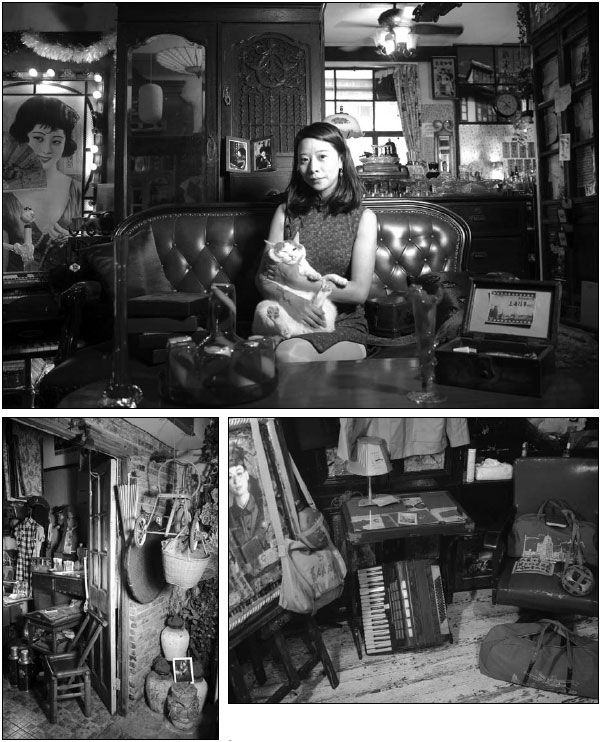
|
Shanghai is a city with an eye to the future - but some residents are nostalgic for times past. Wu Ni chatsto a 'retro-holic' who is collecting pieces of the lost city. For many Shanghai natives, nostalgia is a natural reaction to the rapid and drastic changes that arehappening to the city. Wang Xiaojia went a step further - she built a museum to commemorate the goldendays of old Shanghai. The museum is hidden away in the middle of a residential compound for war veterans. Stepping inside,one is immediately transported into the past, with a nostalgic atmosphere created by the dusky lighting,slow jazz melody and thousands of items reminiscent of old Shanghai. They include qipao, or cheongsam, the popular dress among socialites and upper class women in the1920s in Shanghai, rusty tin boxes for cigarettes, vintage watches and bags, and complete householdarticles used by old Shanghai families from glassware to ashtrays, light bulbs, wash basins, thermoses,sewing machines and wardrobes. Wang named her museum Shanghai 1937, an era in her eyes when the city's prosperity rivaled Parisand New York, but was interrupted by the invasion of the Japanese army. Wang's family has lived in Shanghai for generations. Born in the 1980s, she grew up in a traditionalstone-arched Shikumen lane house. As skyscrapers and shopping malls gradually took over the city, theold houses were demolished, big families dispersed and things that she was familiar with disappeared. She started to collect the old-fashioned items and accumulated so many things that they piled up in astorehouse. Her brother, a photographer, had a vacant photo studio that she thought could be a perfectspace to display her collection. The 200-square-meter studio was transformed into a tiny museum that unexpectedly became a populardestination for those who are fond of local culture and seek old Shanghai flavor. "These exhibits are not expensive or rare, but people feel intimate with them," Wang says. "Visitors arereminded of the times past and beautiful memories." Wang recalls a middle-aged woman who bought a cassette of Fei Xiang, or Kris Phillips, the renownedChinese-American pop icon who was popular on the Chinese mainland in the 1980s. "She said the singer was her idol when she was young but she could not afford the cassette. Now shehad fulfilled her girlhood dream, although the cassette was shabby and the sound quality notsatisfactory," Wang says. Wang works as a stylist but contributes most of her sparetime to the museum. She calls herself a "retro-holic" and isproud that she has saved precious items and their storiesfrom fading from history. On a wall of the museum are a dozen wooden doors shesalvaged from a bulldozer. "I was passing by a constructionsite and saw workers were ready to demolish the houses. Icried out loudly to stop them and said I would take thewooden doors," she recalls. "The doors are no more than 100 years old. They might not be that valuable for antique dealers but theyare precious to me," she says. "Look at those lines and colors, they were sculpted by time." She also has two razors she collected from an old man whose grandfather received them from Americansoldiers, in exchange for food, in the 1940s, when Shanghai was a World War II battlefield. Most exhibits are tradable except for a few personal items. Wang cherishes the pianos she has collectedthe most. The oldest one is an antique Robinson piano dating back to the 1870s that was used in areligious school. The piano keys are made of ivory. A Montrie piano was left by Wang's grandmother. The brand, created by the British and produced inShanghai, was very popular in the 1930s. She also has a Nieer piano, a Chinese produced piano fromthe 1950s. The instrument is simple, and was made without a cover because there was scant access tomaterials in that era. She also has a mini-piano Wang played when she was only a kid. Ann Gu, a 25-year-old Shanghai native, found many exhibits spark memories. "The clothes, bags, vasesand cups, no matter what time they belong to, are exquisite. I think they reveal the pursuit of Shanghaipeople for high-quality and exquisite life," she says. The museum is only open to the public on Saturday afternoons. On otherdays, it is used as a photo studio where customers can dress in the1930s style and pose for photos, or a cute space for friends to haveafternoon tea, or even a small bar where several friends come for a drink.There are plenty of old-fashioned snacks and beverages available here. Wang's brother, who asked to be called by his nickname Lao Hei,explained that the flexible management aims to earn some money tomaintain the museum. He says the collection includes some clothes andnewspapers dating back to a century ago that need to be regularly taken care of. It is not easy for a private museum to survive in the city if it lacks financial support from the governmentor foundations. But the siblings say they will try their best to carry on and hope to find a larger space todisplay the items chronologically. "These exhibits embody what used to be a part of our life. We loved them, commemorate them and wouldlike to introduce them to more people," Wang says. By Wu Ni ( China Daily) |
對(duì)很多老上海人而言,面對(duì)城市日新月異的變化,懷舊之情不免油然而生。一位八零后上海女孩將這種情感付諸行動(dòng),開(kāi)辦了一間獨(dú)特的老上海懷舊博物館來(lái)紀(jì)念往日時(shí)光。 這間懷舊博物館位于上海臨潼路一個(gè)不起眼的退伍老兵住宅區(qū)。一踏入館內(nèi),朦朧的燈光、老式留聲機(jī)里慵懶的曲調(diào),以及上千件大大小小的老上海物件,立刻將參觀者拉回上世紀(jì)的上海灘。 這里陳列的老物件有經(jīng)典的旗袍、鐵煙盒、老上海明星畫報(bào)、古董表、復(fù)古包,還有整套的家庭用品,如玻璃器皿、煙灰缸、燈泡、臉盆、熱水瓶和縫紉機(jī)。 王小佳將這件博物館命名為上海1937。在她看來(lái),上世紀(jì)三十年代,上海的繁華堪比紐約和巴黎,直到1937年日本入侵上海,打破了這種繁榮。 王小佳的家族幾代人一直生活在上海,她從小在石庫(kù)門弄堂里長(zhǎng)大。隨著摩天大樓和購(gòu)物商場(chǎng)逐步占據(jù)城市,王家的老房子拆遷了,原本生活在一起的親朋好友們也四散到城市各個(gè)角落,她所熟悉的老物件也慢慢消失。 這個(gè)從小就喜歡收藏的姑娘開(kāi)始淘老上海的物件,越積越多,最后不得不堆在一個(gè)倉(cāng)庫(kù)里。王小佳的哥哥老黑是個(gè)攝影師,正好有一間攝影棚空出來(lái),兄妹倆就用這個(gè)空間將收藏的老物件一一展出來(lái)。 他們將這間200多平米的攝影棚設(shè)計(jì)成一個(gè)微型博物館。沒(méi)想到的是,博物館成了熱門,吸引了很多熱衷上海文化或?qū)ふ依仙虾8杏X(jué)的參觀者。 “其實(shí)我們的展品并不昂貴或罕見(jiàn),但是人們看到了會(huì)感到很親切,想起從前的美好回憶,”王小佳說(shuō)。 一位中年女性參觀者購(gòu)買了一盒費(fèi)翔的磁帶,這給王小佳留下了深刻的印象。“費(fèi)翔是她少女時(shí)代的偶像,但那個(gè)時(shí)候磁帶很貴,她買不起,而在這里她圓了少女時(shí)的夢(mèng)想。” 王小佳是一位設(shè)計(jì)師,但維護(hù)這間博物館占用了她大部分時(shí)間,她還給自己取了個(gè)外號(hào)---舊貨囤積癥患者。她自豪的是,很多珍貴的老物件都是她從一堆廢舊物件中挽救的。 比如懷舊博物館的一面墻上掛著12扇木制門窗,這是她從推土機(jī)下救出來(lái)的。“那時(shí)候我經(jīng)過(guò)一個(gè)拆遷工地,施工的人正要推倒這些木門,我大吼一聲:不準(zhǔn)動(dòng)!這些門我要了。”她回憶說(shuō)。 “這些木門不到100年,對(duì)古董商人來(lái)說(shuō)可能并不值錢,但是對(duì)我來(lái)說(shuō)很珍貴。你看門上的線條和深淺不一的顏色,這些可都是時(shí)光雕刻出來(lái)的。” 她津津樂(lè)道的還有從一位老人家中收集的兩把剃須刀。上世紀(jì)四十年代,這位老人的爺爺在大名路的碼頭用上海食品跟美軍士兵交換了這兩把剃須刀。 除了一部分王小佳的私人藏品,博物館的大部分物件是可以交易的,參觀者可以購(gòu)買或者用其他的老物件來(lái)交換。 王小佳最珍視的是老鋼琴。最老的一臺(tái)羅賓遜鋼琴可以追溯到1870年,鋼琴的琴鍵是象牙制成,供教會(huì)學(xué)校使用。另外一臺(tái)摩德利鋼琴源于1930年,小佳的奶奶曾經(jīng)彈過(guò)。還有一臺(tái)上世紀(jì)五十年代生產(chǎn)的聶耳牌鋼琴---由于物資匱乏,這架鋼琴甚至沒(méi)有琴蓋。此外還有她一歲時(shí)彈過(guò)的小鋼琴。 25歲的顧安是地道上海人,很多展出的老物件和她記憶中一模一樣,這讓她非常感動(dòng)。“這些瓶瓶罐罐,還有其他的物件,不管屬于哪個(gè)年代,我覺(jué)得都很精致,這和上海人對(duì)高品質(zhì)和精致生活的追求是一致的。” 目前,懷舊博物館只在周六下午對(duì)公眾免費(fèi)開(kāi)放。在其他時(shí)間,這里可以是攝影棚,懷舊愛(ài)好者可以身著年代服裝,拎著復(fù)古包,利用老式場(chǎng)景拍攝照片。感興趣的參觀者可以打電話預(yù)約,在這里喝下午茶或者朋友小聚。 王小佳的哥哥老黑解釋說(shuō),這種靈活的經(jīng)營(yíng)模式是出于成本的考慮。很多有百年歷史的衣服和報(bào)紙需要定期維護(hù),博物館也要支付租金。確實(shí),維持私人博物館并不容易。上海的一些小型私人博物館由于得不到扶助而被迫關(guān)門。 不過(guò),這對(duì)兄妹表示他們會(huì)堅(jiān)持下去,并希望今后找到一個(gè)更大的場(chǎng)所,將這些展品按照年代順序陳列出來(lái)。“這些老物件是我們?cè)?jīng)生活的一部分,我們很喜歡,并希望更多人能了解。” 相關(guān)閱讀 轉(zhuǎn)基因產(chǎn)品到底離我們的生活有多近? 養(yǎng)老服務(wù)業(yè): 鼓勵(lì)私營(yíng)部門參與 高考改革方案出爐 老師學(xué)生存在意見(jiàn)分歧 聯(lián)合國(guó)電影宣傳 關(guān)注女性艾滋病感染者 (中國(guó)日?qǐng)?bào)記者吳妮) |
